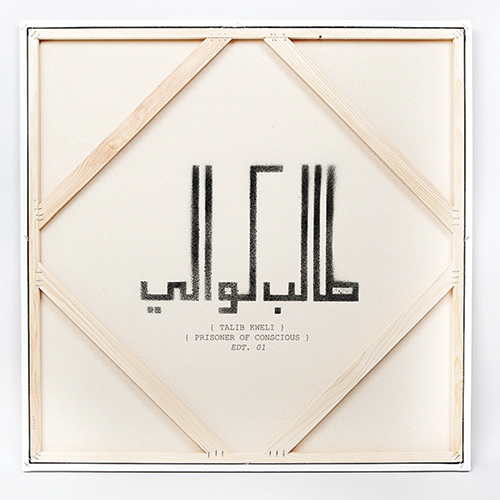Talib Kweli is the Tracy McGrady of hip-hop. The analogy is apt: There are few others in their respective fields who started out with so much potential, promise, fan loyalty and awe-inspiring skill only to somehow fumble it all away.
The art of trying too hard

Talib Kweli is the Tracy McGrady of hip-hop. The analogy is apt: There are few others in their respective fields who started out with so much potential, promise, fan loyalty and awe-inspiring skill only to somehow fumble it all away.
While T-Mac was recently spotted hooping in China before joining the Spurs as the last man off the bench, Kweli just dropped Prisoner of Conscious, an ironic title indeed for his seventh album (fifth if you’re not counting the two Reflection Eternal joints with DJ Hi-Tek).
Kweli burst onto the underground scene a la the Kool-Aid Man as one half of the group Black Star (with cohort Mos Def). Their classic eponymous album helped Kwe establish himself as an emcee to check for, and led many underground heads to evaluate him as an artist who could one day be mentioned with the greats.
What made him so compelling to the Jansport and Timbs crowd? As he put it in a DJ Tony Touch freestyle, “I just combine battle skills and conscious and I still flow the tightest.”
That ability to seamlessly come off as a substantive artist with the sort of pen game that had heads chronically pressing rewind on his verses is why he became one of the standard-bearers—along with Pharoahe Monch and Mos Def—of the Rawkus Records-led “indieground renaissance.”
Kweli followed up Black Star with the critically acclaimed (and dope-in-its-own-right) Reflection Eternal album Train of Thought, and it seemed the sky was the limit. Quality was his first truly solo endeavor, and his profile was raised by the Kanye West-produced banger “Get By”; Jay-Z even hopped on the remix.
Kwe had his T-Mac 2002 All-Star game off-the-backboard-dunk moment when Hov later name-dropped him on The Black Album’s “Moment of Clarity”: “If skills sold/truth be told/lyrically/I’d probably be Talib Kweli.”
But just like McGrady, Kweli couldn’t use his big moment as a career jumping-off point.
Early in his career, Kweli got a lot of criticism from some circles about his style of rapping. From the outset, it seemed like Kweli had so much to say that he felt the need to get the most out of every bar by cramming in more words than the average emcee. It worked, though!
This was part of the appeal surrounding him in the first place: Kweli had so much on his mind, both in terms of social commentary and ridiculous punchlines, yet miraculously managed to make it all fit.
A small minority saw his flow as awkward, but for everybody else it was tighter than the lid of an unopened pickle jar. Unfortunately Kweli let his taste of mainstream success and his detractors’ criticisms dictate how he did his thing, and he gradually changed his style into something more palatable to the masses.
The result? Consecutive wack releases that saw Kweli trying his damndest to sound like everybody else, until a semi-return to form with 2008’s Eardrum (which was buoyed by excellent production more than anything).
Prisoner of Conscious is Kweli’s first album since, and while his Rawkus litter-mates Mos Def and Pharoahe Monch continue to make good music, Kweli ultimately continues the trend of alienating those who rode so hard for him in his career’s formative days.
Prisoner of Conscious starts out auspiciously enough, with Kweli spitting with the intensity of a man possessed by a previous incarnation of himself on “Human Mic.” Over a heatrock beat provided by Oh No, Kweli hops in a DeLorean and resurrects his flow from years past—and the final product is scintillating.
This is a man on a mission, and it serves as a warning to emcees: This cat is coming to lyrically beat that ass. This is the Talib Kweli that fans know and love.
Prisoner of Conscious
Javotti Media
✭ ✰
The very next track, “Turnt Up,” produced by Trend, is when listeners get their hopes up for the rest of the LP in earnest. Trend swipes the drums from Rakim’s classic “Paid In Full,” but what he does over those drums is absolutely beautiful.
Kweli pays homage to Rakim with his opening lines, while Trend laces the beat with haunting vocal samples and adds some extra kick with booming 808s.
Unfortunately, those quality tracks early on end up being one of the most heinous bait-and-switches in recent memory. The album is full of guest shots, and on the tracks “Push Thru” (featuring Curren$y and Kendrick Lamar) and “Rocket Ships” (featuring Busta Rhymes) Kweli gets bodied on his own shit. Not a good look, B.
Production-wise, Prisoner of Conscious is a snoozer, and it’s weighed down by an overabundance of saccharine R&B—rap ’n’ bullshit.
Satirically, Kweli styles to break his “conscious” shackles, spitting over a beat on “Upper Echelon” that’s consistent with what you hear on the radio. A miserable failure, it’s cheesy enough that you may want to have a fondue pot at the ready.
Whatever happened to the guy who blessed us with “2000 Seasons” or defiantly took a stand with lines like “Kurt Loder asked me what I’d say to a dead cop’s wife/cops kill my people every day, that’s life”?
If Prisoner Of Conscious is any indication, someone locked that Kweli up and threw away the key.







